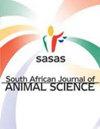Effect of functional oil in piglet feeding and its effects on total blood count, health parameters, and gastrointestinal tract structure
IF 0.6
4区 农林科学
Q3 AGRICULTURE, DAIRY & ANIMAL SCIENCE
引用次数: 0
Abstract
This study was performed to evaluate the effects of a functional oil blend (castor oil plus cashew nutshell oil) on complete blood count, health parameters, and intestinal structure in nursery pigs. A total of 128 crossbreed piglets (6.79 ± 1.76 kg of body weight) were allocated in a randomized complete block design with two dietary treatments: a functional oil-free diet or a diet based on added functional oil (1500 mg functional oil blend/kg of diet). Both diets had 400–500 mg colistin sulphate/kg. Pigs fed functional oil had higher erythrocytes and monocytes on days 11 and 23, respectively. Lymphocyte concentration was reduced, and ileum pH was increased in pigs fed functional oil on day 23. On day 37, lower jejunal pH was observed. However, no treatment effect on diarrhoea occurrence was observed. The lactic acid bacteria count was greater in jejunum and ileum of pigs fed functional oil on day 23. Pigs fed functional oil had more jejunal lesions on day 37. Based on the criteria of this study, dietary supplementation to piglets with functional oil blend changed the concentration of erythrocytes and monocytes as an important role in the defence of the organism; however, it showed a reduced capacity to modify the pH in small intestinal contents, which was reflected in an absence in the incidence of diarrhoea. In addition, piglets fed the functional oil blend had improvements in lactic acid bacterial counts, without the ability to attenuate lesions in the jejunum.功能油在仔猪饲粮中的作用及其对仔猪总血细胞计数、健康指标和胃肠道结构的影响
本研究旨在评估一种功能性油混合物(蓖麻油加腰果果油)对保育猪全血细胞计数、健康参数和肠道结构的影响。试验选用128头体重(6.79±1.76 kg)的杂交仔猪,采用完全随机区组设计,分别饲喂无功能油饲粮和添加功能油饲粮(1500 mg功能油混合料/kg饲粮)。两种饲粮均添加400 ~ 500 mg硫酸粘菌素/kg。饲喂功能油的猪在第11天和第23天红细胞和单核细胞含量分别较高。第23天饲喂功能油的猪淋巴细胞浓度降低,回肠pH升高。第37天,空肠pH值降低。然而,没有观察到治疗对腹泻发生的影响。第23天饲喂功能油的猪空肠和回肠乳酸菌数量较高。第37天饲喂功能油的猪空肠病变较多。根据本研究的标准,在仔猪饲粮中添加功能性油混合物改变了红细胞和单核细胞的浓度,这是机体防御的重要作用;然而,它显示出改变小肠内容物pH值的能力降低,这反映在没有腹泻的发生率上。此外,饲喂功能油混合物的仔猪乳酸菌数量有所增加,但没有减弱空肠病变的能力。
本文章由计算机程序翻译,如有差异,请以英文原文为准。
求助全文
约1分钟内获得全文
求助全文
来源期刊

South African Journal of Animal Science
农林科学-奶制品与动物科学
CiteScore
1.50
自引率
0.00%
发文量
39
审稿时长
>36 weeks
期刊介绍:
The South African Journal of Animal Science is an open access, peer-reviewed journal for
publication of original scientific articles and reviews in the field of animal science. The journal
publishes reports of research dealing with production of farmed animal species (cattle, sheep,
goats, pigs, horses, poultry and ostriches), as well as pertinent aspects of research on aquatic
and wildlife species. Disciplines covered nutrition, genetics, physiology, and production
systems. Systematic research on animal products, behaviour, and welfare are also invited.
Rigorous testing of well-specified hypotheses is expected.
 求助内容:
求助内容: 应助结果提醒方式:
应助结果提醒方式:


